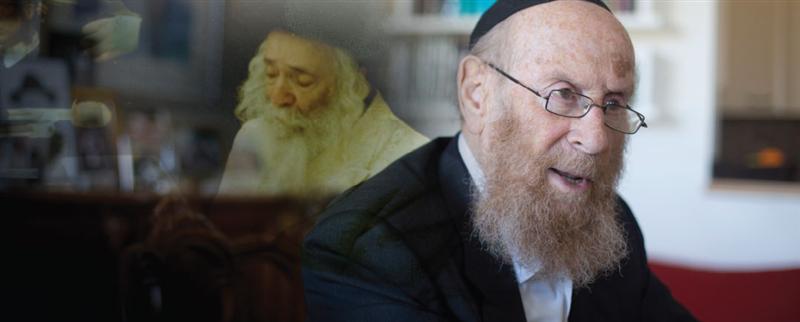Memories of Forgotten Times
| August 3, 2016
When he met the Sanzer Rebbe shlita and was feted as one of the last survivors of a holy world gone black he explained how a young boy of 16 could preserve his Yiddishkeit all alone holding on to the ethics of his fathers and mentors both in a place of barbaric degradation and in a foreign city where complete freedom beckoned
H
e was the Sanzer Rebbe’s guest of honor the object of a great deal of excitement in Netanya’s chassidic court. They even gave him a three-page spread in their periodical. After 60 years as a successful businessman in Milan Italy Mr. Aron Tenenbaum now 92 relocated to Jerusalem in 2011. But what made him a celebrity among the Sanz-Klausenberger chassidim was the discovery that Mr. Tenenbaum could share rare firsthand memories from the prewar empire of Sanz.
Aron Tenenbaum was born in 1923 in the town of Brigel situated in the part of Galicia that was a center of Sanzer chassidus. An old-time self-effacing Jew Mr. Tenenbaum knows what all the fuss is about — his eyes have seen greatness and his memories are clear and incisive.
He was a chassidish boy in a small shtetl in Galicia a nameless inmate in seven concentration camps and an affluent Italian Jewish businessman. Today Mr. Tenenabum is a retired great-grandfather in Jerusalem yet the raging tides of time have not affected his deepest core.
A picture window and open porch provide a golden Jerusalem panorama a new-ancient home for this man who has lived through so much. “I can’t say I miss Milan but I can’t say that I don’t miss it” he offers philosophically. “I spent 63 years of my life there.”
They were industrious years. Mr. Tenenbaum was a prosperous watch dealer and simultaneously one of the pillars of Milan’s Jewish community serving as baal tefillah and baal korei in the Via Cellini beis medrash and as an active chevra kaddisha member.
Grandchildren and great-grandchildren smile from portraits and snapshots placed all around the tasteful room. Mr. Tenenbaum’s late wife Gerty is a key part of the story a quietly supportive companion whom he praises effusively as a full partner in his life’s endeavors. On a colorful photographic collage of the Tenenbaum offspring one picture stands out — a black-and-white head shot of the Brigele Rav Rav Moshe Lipshitz. Mr. Tenenbaum’s Galician roots are as much a part of him as the more recent role of Italian Jewish businessman. Today in Jerusalem it’s all come together.
The Rebbetzin's Blessing
Mr. Tenenbaum’s Yiddish is a rich Galician dialect although Polish and Italian are his other languages — one representing his origins the other his adopted country. His tone is serious but occasionally a touch of wry humor breaks through to the surface with a small smile. It’s a conversation laced with wisdom learning and a lifetime’s experience.
He of course never met the sainted Divrei Chaim of Sanz who passed away in 1876 but the holy Sanzer Rebbe’s influence — and his descendants — continued to sustain the Jews of the region.
“I knew four children of the Divrei Chaim” Mr. Tenenbaum remembers. (The Divrei Chaim had eight sons and seven daughters from two marriages and these were children of his later marriage.) “Reb Shayele of Tchechoiv Reb Shulem Leizer of Ratzfert and his daughters Chumele who lived in Sanz and Gitsha. I saw them when they all came to Sanz each year for the Divrei Chaim’s yahrtzeit on the 25th of Nissan. That day was like a Yom Tov — thousands came from all over Poland. Reb Shulem Leizer was an old man and they carried him on a chair. There was a huge crowd attending the yahrtzeit but when I was little my father held me in his arms so I could see. We also saw the tzaddik Reb Shimale Zelchover who came for the yahrtzeit. My father took me to the beis medrash to see him reciting Shema at night. It was a sight I’ll never forget. Incredible.”
When Mr. Tenenbaum was “discovered”and began sharing his recollections the current Sanz-Klausenberger Rebbe — realizing that few people in the world if any could still be transported to that place with their memories — was more than eager to hear this firsthand account. And so were we.
Of all the Divrei Chaim’s progeny Rebbetzin Gitsha was the one Mr. Tenenbaum knew best. “She took kvittlach like a rebbe. One time when I was a young boy Rebbetzin Gitsha visited the Brigele Rebbetzin and people brought kvittlach. I was there because I used to hang out there and the Rebbetzin who knew me said to Gitsha ‘Bentsh dem yingel.’ Gitsha asked me ‘What should I bentsh you with?’ and I answered ‘Hasmudeh tzi lernen.’ So that was what she blessed me with.
“Nu I try to go and learn” he says simply of the substantial chavrusashaft he maintains avidly through thick and thin.
Oops! We could not locate your form.












